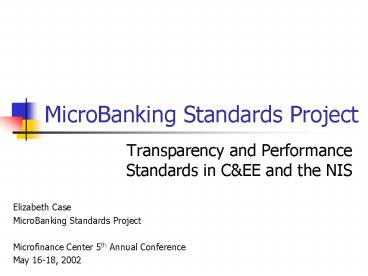MicroBanking Standards Project - PowerPoint PPT Presentation
1 / 32
Title:
MicroBanking Standards Project
Description:
The MicroBanking Standards Project: international benchmarks for ... Yugoslavia. Selected Peer Groups from MBB8. Preview of the MicroBanking Bulletin no. 8 ... – PowerPoint PPT presentation
Number of Views:70
Avg rating:3.0/5.0
Title: MicroBanking Standards Project
1
MicroBanking Standards Project
- Transparency and Performance Standards in CEE
and the NIS
Elizabeth Case MicroBanking Standards
Project Microfinance Center 5th Annual
Conference May 16-18, 2002
2
Outline
- Why does the Microfinance industry need
transparency? - Performance Monitoring and Benchmarking
- The MicroBanking Standards Project international
benchmarks for MicroFinance Institutions (MFIs) - Preview of MBB8
3
Transparency on Financial Performance is Key
- Clear definitions
- Detailed information
- Flexible reporting
- Availability of peer data
- Standards
- Good data collection tools
- Adapted MIS system
- Willingness to share information
4
Who Benefits?
- MFI management
- Current funders
- Prospective funders (i.e., investors, donors,
lenders) - Industry as a whole
5
Status Transparency in Microfinance is Very Low
- Lack of reporting standards
- Poor quality of information
- Variable MIS systems
- Low incentives for reporting data
- Insufficient rating and benchmarking activities
(lack of comparable information on a large number
of MFIs) - High costs involved in collecting data
- MFIs are not operating at their full potential
6
Current Initiatives
- Roundtable discussion on standardization
- Standard financial terms
- Standard ratios
- Standard adjustments for MicroFinance
- Performance Monitoring and Benchmarking Toolkit
- The MicroFinance Information eXchange (MIX)
7
Performance Standards
- Why monitor performance?
- Provides a guideline to strengths and weaknesses
- Creates a roadmap to improve performance and
increase outreach - Enables to meet reporting requirements
- Increases access to funding
8
Advantages of Benchmarking
- Puts performance indicators in context
- Enables mapping of experiences at a local level
- Constitutes a resource for the development of
capacity-building initiatives
9
Future Challenges
- Create standards and evaluation criteria
- Create appropriate data gathering tools
- Focus on value-added of transparency to the MFIs
- Assist MFIs in cost-effective evaluations
- Increase rating and benchmarking activities
10
The MicroBanking Standards Project
International Benchmarks
- Collects financial data and tracks performance of
more than 150 MFIs around the world to create
standards of performance - Provides individual feedback to participants on
over 20 indicators (outreach, portfolio
management, overall financial performance,
efficiency, productivity, etc.) in Financial
Performance Reports - Disseminates results bi-annually by peer groups
keeping individual data confidential in the
MicroBanking Bulletin (MBB) - Supports local networks of MFIs and apex
organizations in developing national level
benchmarks
11
The Data Flow
- Data collection
- Data verification
- Data input
- Data adjustments
- Data validation
- Peer Group creation
- Data analysis
12
Standardization Process
- Reclassify the chart of accounts into a common
format - Adjust data to ensure apples to apples
comparison - Create Peer Groups of similar institutions
- Ex Eastern Europe - Medium
- Total outstanding loan portfolio 1.5m to 10.0m
USD - Target high-end and broad markets
13
Making the data comparable adjustments
- Inflation
- Cost of funds
- In-kind subsidies
- Donations
- Loan loss reserve
14
Peer Group Criteria in the MBB
Peer group criteria
15
Selected Peer Groups from MBB7
16
Representation from CEE and the NIS in the MBB8
- Albania
- Armenia
- Azerbaijan
- Bosnia Herzegovina
- Bulgaria
- Croatia
- Georgia
- Kazakhstan
- Kyrgyzstan
- Poland
- Romania
- Russia
- Yugoslavia
17
Selected Peer Groups from MBB8
18
Preview of the MicroBanking Bulletin no. 8
Note Figures may change in the final version of
MBB8.
19
Preview of the MicroBanking Bulletin no. 8
Note Figures may change in the final version of
MBB8.
20
Preview of the MicroBanking Bulletin no. 8
Note Figures may change in the final version of
MBB8.
21
Preview of the MicroBanking Bulletin no. 8
Note Figures may change in the final version of
MBB8.
22
Conclusion
- Transparency is Key to Sound Financial
Performance - Improvements in data collection
- Improvements in data quality
- Standardization
- Benchmarking
- Benchmarking is an extension of performance
monitoring, and national and regional networks
have a key role to play in increasing quality and
validity of benchmarking activities
23
The Tools
- For MFIs
- Excel Model for Performance Monitoring
Performance Monitoring - Customized Financial Performance Reports (for MBB
participants) - For Local Networks/ Apex
- Performance Monitoring and Benchmarking Toolkit
- For Industry
- MicroBanking Bulletin Peer Group Statistics and
future on-line database
24
Performance Monitoring and Benchmarking Toolkit
- Suggested formats for financial statements,
questionnaire - Software (based on Microsoft Access)
- Manual
- MicroBanking Bulletin peer group data
25
In-line with Microfinance Best Practices
- Adjustments (inflation cost of funds in-kind
subsidies donations loan loss reserve) - In line with CGAP minimum disclosure requirements
- Will be updated regularly to reflect industry
standards (terminology, definitions)
26
Performance Monitoring Benchmarking Overview
of MBB Database
- Input general and financial information
- Apply adjustments (automated)
- Create peer groups
- Produce reports
27
MBB Toolkit Database General Information
- Input statistics about the MFI
- Region of operation
- Date created
- Products offered
- Target market
- Staff
- Clients, etc.
28
MBB Toolkit Database Financial Data
- Input financial data from financial statements
reported by the MFI - Apply standard adjustments
29
MBB Toolkit Database Reports
- Provide feedback through comparative reports
30
MBB Toolkit Database Programs
- Create benchmarks at a local level
31
Target User for the Database Networks of MFIs
who want to help their members improve their
financial performance
- Create standards at the regional level
- Provide feedback to members
- Exchange data with MBB
32
For more information
- Contact us at www.microbanking-mbb.org
- or write to mbb_at_microbanking-mbb.org































